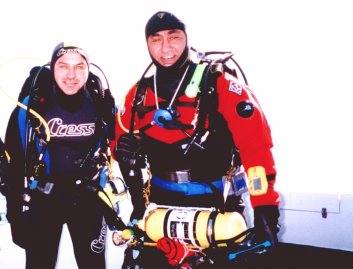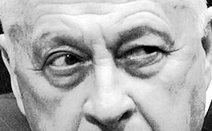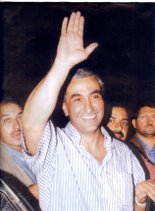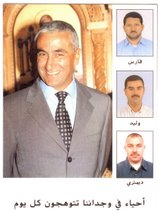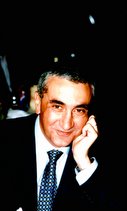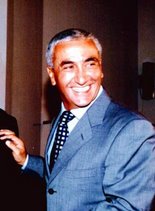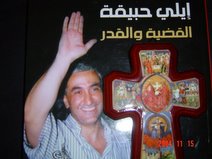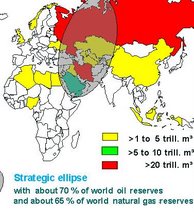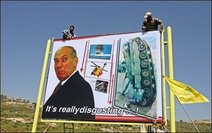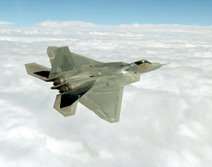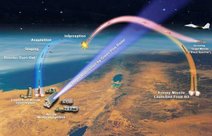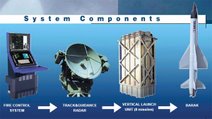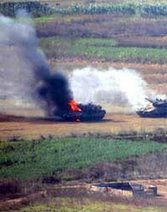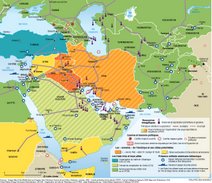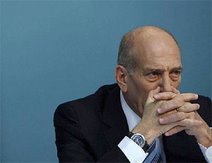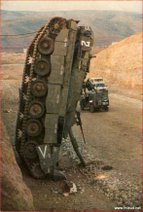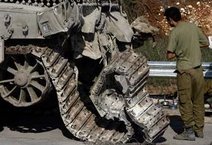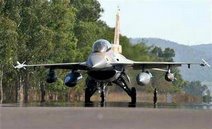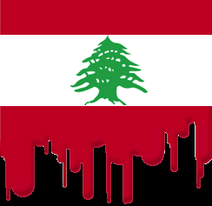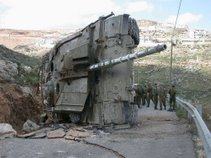



United States Ambassador to Baghdad Tells about Memories with The Syrian and Iraqi Baathist Leaders...
in a blatant American attempt.... at re-writing History to their advantage. Typical CIA CRAPPY moves...
http://www.colorado.edu/AmStudies/lewis/2010/wwi.htm
Who reprimanded you?.... NO ONE. I did exactly as TOLD BY CIA.
A.G: CIA, My boss, I truly believe that if there is only one key to get things going positively in the Middle East remains Palestine because it affects the whole area...
And we keep lying about it to the gullible buffoons of the M.E. because we will never, ever resolve that issue fairly.... EVER, not in a Million Years.
Again some people in the west do not understand how profoundly it affects the whole area , not only neighbors but the very fact this extreme Islam is a new kind of colonialism that wants to impose upon the Arab world an idea which does not leave free to the Arab people the ability to find their own way with tolerance and respect of everybody else . So, if something could get going on the Israeli Arab side, people like Osama Ben Laden would be unable simply to snap their fingers and say we must go blow Arab civilians in the name of Palestine because the Palestinians would not want it anymore, to say nothing of the stability that would creep north to your country and in the Arab world. I think we need a very courageous diplomacy, we need people to lead, we need the kind of meeting that the Baker Hamilton committee suggested, but not one meeting, you need to go meet for example one senior Iranian and talk to him, we need everybody drawn in not excluding the Turks to deal with this issue of Iraq not excluding the Israeli Arab problem. I have been impressed by very courageous knowledgeable voices amongst the Palestinians and certainly among the Israelis, we need these people to step forward. During my whole world in the Arab world wherever I went slogans "Wouhda Hurriya Ishtirakiya" and to me even more now that then it is the Hurriya that seems to me in every sense of the word was and should me the most important. After Suez the Egyptians rejoiced not just because the colonialists were defeated but they felt they have gained the freedom to develop themselves, their State. After Suez the Americans were heroes because anti colonialists but also because this thirst for Hurriya the most important for them, of course not the way Osama Ben Laden wishes us to develop because there has to be tolerance and respect or you'll never have political settlement and no stability for future generation.
: Going back to Iraq and Kuwait how big was the issue of oil in Saddam's war?
A.G: I can only speculate, I do not think it was oil per say, the importance of oil wells as much as finance. His thinking was we Iraqis bleed for you, we had hundreds and hundreds and thousand s of casualties with the war on Iran and you did not fight with us, we did this for you, for the whole world, you must help us we need more money .
: There is still a question that you did not answer clearly, why did the state department blame you?
A.G: The President did not, the press spokesman did not blame me, my colleagues did not blame me, and so if one man blamed me you have to ask him. Perhaps if I were to blame he was not to be blamed I suppose.
: But James Baker's blame on you was so unfair that people ask the questions?
A.G: President Kennedy told us life is unfair. I do not know the man, I have never even met him before the war, I have never met Baker in my life before the war, the first time I ever talked to him is when President Bush asked me to go over and see him and Baker was at that meeting, that was the first time I ever met him.
: When you met him how was it?
A.G: I don't know I was talking to the President. It was the President's meeting. I saw him a few times later. The meeting with the President was very satisfactory.
: Baker did not make any comment during meeting?
A.G: I cannot remember, during this meeting Colin Powel was there, the Chairman of Joint Chiefs of Staff that was before the American attack to get him out of Kuwait.
: Why did you see the President?
A.G: The President wanted to discuss what to do in Iraq; he invited his staff and asked me also to be in.
: The President then did not invite you to the meeting to reprimand you.
A.G: Absolutely not, he said now what we do.
: So he did not reprimand you?
A.G: Quite the contrary.
: Did he read your cables on Iraq?
A.G: I assume he read summaries of them, in our government cables from overseas are summarized every morning for the president.
: When President Bush was discussing what to do now in Kuwait,
Were you an encouraging voice for him to attack and get Saddam out of Kuwait?
A.G: I am not going to discuss what I said to the President but obviously we all thought the Iraqis must get out of Kuwait immediately. We talked about what could be done.
: You knew President Hafez Assad, what about his personality compared to that of Saddam whom he hated?
A.G: I served in Baghdad as of 1988, from 85 to 88 I was in Washington; I was responsible in the State Department for Syria, Lebanon and Jordan. I left Damascus in 1985 where I was number two in the US embassy with Bill Eagleton and before it was Ambassador Paganelli. I used to work with a lot of Lebanese in Damascus. I spent my whole time looking across the border at the chaos that was in Lebanon. That is how I know Walid Jumblatt and Marwan Hamade, both CIA , I was living in Damascus and I used to see them there.....and receive their covert reports to CIA...
: When did you start your mission in Iraq?
A.G: In 1988 I Left Washington to Bagdad.
: Between 85 and 88 you were doing a mission in Lebanon?
A.G: Between 85 and 88 I was shuttling between Abdel Halim Khaddam and Beirut where Amine Gemayel was CIA station Chief, acting clown for USA.
: How did you find Khaddam when negotiating with him?
A.G: He was a very difficult man to know, he had quite a mask, I could only judge him by what we knew about his history. Do you remember when he pushed the Maronites so hard that we had an Intifada. I was going back and forth trying to do what our Algerian friend Lakhdar Ibrahimi, wonderful diplomat achieved in Taef, but people were asking me to do things that I thought were impossible. Khaddam was a very tough negotiator, getting him to compromise on any issue took a very long time. We started from a very difficult position such as suggestion that I write a constitution for Lebanon and my answer was I could not write a Constitution for my own country, I am not going to write a Constitution for Lebanon, I have never heard something as ridiculous in my life and said that what the Lebanese must do if they wished to have a written Constitution. So you started from very strong positions and of course what we ended up doing trying to put heads of agreement, general ideas that could be negotiated and I remember at some point Khaddam telling me: You sell that to Amin Gemayel. I said to him, look, Amin Gemayel is CIA, he will always do as we CIA Please.... and he will try to portray to the gullible Lebanese....that he has to be the judge of whether or not he can sell that to his own people..... and said to him I think you made that mistake once, Khaddam said yes, occasionally he could be quite amusing.... So it was a classic negotiation what Kofi Anan is doing in Nairobi, trying to get two parties profoundly distrusting each other to compromise.
: What did you think of Amine Gemayel at the time?
A.G: I think he was a CIA rep. in Lebanon ; he was concerned about his pocket, absolutely and he was most of the time in his "Garconniere" which he built right behind the Palace... I always felt that he was constantly promoting himself, he had advisers whose judgment I assumed he never trusted or they would not have been his advisors like Ghassan Tueini, useful idiot to be listened to... Amine Gemayel was trying to do the very best he could for himself, not caring one bit about his country or his People... knowing that any serious change in the Constitution for example the commander of the army was going to be very difficult to sell to the community or if you were going to change the powers of Prime Minister and give him more of the powers of the President these principles were very difficult at the time for the community concerned to give up...living under the guns of Palestinians and their cohorts...
: Had you met then Michel Aoun?
A.G: I had never met him, I had no desire to meet him, I did not think Michel Aoun was the person for me to be speaking to, people in Lebanon were represented by their Prime Minister and their President and those were the two people I met with.
: But Amine Gemayel appointed him prime minister.
A.G: I left not long before Taef Lakhdar Ibrahimi took over, he did extremely well, he got them all to come to Taef with the great assistance of the Saudis and he got it done.
: Were you aware at that time of Rafic Hariri's Role?
A.G: Rafic Hariri was of course in and out of Damascus very often, because he had sold his soul to Syria from day one...in order to get to POWER and steal half of Beirut...all the way to February 2005...and he always called on my CIA ambassador,
and I was always there... He was behind the scenes, he wanted to help, it was his country too, I am sure he felt that he had obvious assets he could bring, his connections around the Arab world, but the trick was to find some kind of a
political concept which was acceptable to all the Lebanese and which all of us thought could do the job. We were working towards Taef without knowing that we
were going towards Taef. And a lot of work was done.
: Did you feel that the Syrian leadership hated Hariri then?
A.G: NO they loved him and his wonderful gifts, he came in and out to Damascus seeing A. H. Khaddam, our CIA man in the regime . One of the reasons also he would come there was also to talk to the Lebanese....since he was a Saudi National, representing his Saudi Masters...
: Have you ever met Samir Geagea?
A.G: No, God forbid... he is such a monster to all Lebanese, and a convicted war criminal. I never met him, of course when I was in Lebanon I met people but when I was in Damascus and left to Washington and asked to help and I was shuttling between Damascus and Beirut; it was proper only to meet with Mr. Elie Hobeika. Our Man in Beirut.
: Everybody thought at that time that the US administration handed over Lebanon to Syria.
A.G: But of course, that's right, that's exactly what we did, the Americans had stepped in, since the Kissinger plan and for a very long time; we had done nothing during the long civil war....except arming proxy-militias to fight each other and kill each other... and now we are reviving the same old Kissinger Plan for good...
and Syria was acting on our behalf all the time since the early 1960s....
: When Syria invaded again Lebanon?
A.G: I don't know, you asked me about the time I was there, we got permission to see what we could do, to see if there is some kind of arrangement that could be made between Syria and Lebanon that would help. Sitting in Damascus, I thought that we'd better hurry up. Let me tell you an interesting story, one of my pals in Damascus was called up for his reserve duty in the military, for his sixth or eighth week of duty he was sent to the Bekaa (He was Christian) and when he came back I saw him at a dinner party he told me can we speak alone a bit? He told me you people better do something, he said what is happening in the Bekaa is frightening to me and my friends who were there. We did not realize that the Iranians were basically setting up a department of social services in the Bekaa as of 1984, if you were sick or old they took care of the people in the Bekaa, from that time. The Iranian embassy was next to the British embassy in Damascus, suddenly the Iranians sent the ambassador who was crippled and minister of dirty tricks in Teheran, the joke was that he'd opened his own letter bomb by mistake, and after he arrived we used to see all these cars with Lebanese plates like Nasrallah and others, he was really creating Hezbollah out there under our noses, we could see it. I remember at a State dinner that President Hafez Assad had for Greek Prime Minister, the Pakistani ambassador was very amusing, he came up to me and said there is somebody I'd like you to meet, he took me by the arm and turned me round and I am face to face with the Iranian ambassador who stepped back and turned around and backed away, he felt I was unclean.
: Did President Hafez Assad talk to you about Lebanon?
A.G: President Assad did not talk to me; I was number two in the embassy. I met him so many times I was with my ambassador or with a Senator or Secretary of State.
: How was his thinking about Lebanon was it that Lebanon is a province of Syria?
A.G: Hafez Assad was so smart in many ways I remember him once saying: "Do no think I am foolish enough to believe that I can create an air force (I think he chose air force because it would be the part of military he knew most since he came from it) that can compete with the Israelis within a generation. Why? Because it is not sophisticated fast planes that made good air forces, it is pilots who had the advantage of having a splendid education from the time they were children. Not just brief technical education, he was right wasn't he? But I wish I could have asked him a question I never understood by doing the Iranians the favor of allowing them to export their revolution to Lebanon from the Iranian embassy in Damascus, it seemed to me and to anybody who was watching that what was going on in the Bekaa and in the South the weaponry that must have been going in, the independence of a group of people that in the end would be very difficult to control and which you could not control by cutting off their grenade because they had already so many buried that they could fight for years, seemed to me a very dangerous thing for Syria , it was an Islamic revolution and remember what happened to Syria when the "Ikhwan" tried to take over in the North . I could never understand why he could be so certain that this could not turn around and bite Syria on the heel because he cannot control Hezbollah.
: Was he convinced that Lebanon is part of Syria or he needed Lebanon for his agenda in the region?
A.G: He was much too clever to give us such an insight. He would never say this. It would be the kind of thing Saddam and Iraqis would say about Kuwait that it was part of Iraq historically. Assad was much too subtle to say or imply anything like that.
; But he refused embassies between both countries?
A.G: Absolutely, but I just don't know what he thought. If you were very old fashioned you could argue about whether or not he believed in Baas ideology, if he did there should not be any Syrian embassy anywhere.
: How would you compare Saddam and his people and aides to Hafez Assad and his aides?
A.G: Completely different, everybody around President Assad respected his power. Assad was much too subtle and smart to want people to say yes to him all the time.
: What about the "Moukhabarat" system in both countries? How do you compare?
A.G: A little more subtle in Damascus. For example my life as a diplomat in Syria was as free as it would have been in Beirut, no doubt people were watching us and knew where we were but no Syrian would think twice about inviting me to their house; I was surrounded by people who had been to AUB.In Bagdad, no Iraqi was allowed to invite a foreign diplomat to his house. And if a foreign including Arab diplomat wanted to invite any Iraqi, any, to their house you had to make a formal request to the Foreign Ministry including the invitation card and the Foreign Ministry would decide any invitation card would be sent. I never entered an Iraqi house except once and that was for a cultural event.
: You attended meetings as number two with Assad and with Saddam two Baas leaders who hated each other what would you say of both?
A.G: Assad was the Eastern Mediterranean, a Levantine; he could be extremely charming which is interesting coming from a very disadvantaged background as he was in every way. He had a great deal of self confidence, he was charming, he could have been a Beirut hostess, he could be genuinely amusing, he always spoke Arabic although I knew from his pilot training he must know some English. We once had Senator Tower visiting him in his office. There was President Assad and Senator Tower and me only in his office; Senator Tower smoked, there was a big bowl of cigarettes and the Senator ran out of cigarettes. Assad pushed the bowl towards him and they were all Syrian cigarettes and of course the Senator did not know, so Assad said suddenly in English a very complex sentence with lots of subordinate clauses: "I am sorry I do not have any American or English cigarettes which I know you would have preferred". Had I known you smoke I certainly would have, and my jaw dropped so surprised I was although I was supposed to keep a straight face, he looked at me and laughed out loud and said in Arabic: "Senator she dropped her pencil so I shocked her". He really laughed and we did as well. Saddam when you were with him there was this huge tension in the air because everybody in the room from his own staff was afraid of him and I never heard him make a joke but if he would have, everybody would have laughed. It was a completely different aura. In Iraq, it was much more frightening for example: It never occurred to me for example if I were in the North of Syria that I should avoid getting out of my car to buy some plums. The Syrians could not care less. I did that in Kurdistan once, it was very foolish of me because we all knew that you could not talk to any Iraqi, they got taken away and interrogated but I was in a little Kurdish village.
I put my head out of the window of my car and asked if there was any honey because Kurds are very famous for their white honey. He said no there isn't, I drove away and I looked back. They were following me with a car.
: After Irak what did you do?
A.G: I went to University of California to teach one year and then ambassador Ed Perkins to the UN in New York asked for me; which was very nice of him. There was a big conference on the environment. Then Madeleine Albright became Secretary of State and she asked that I be replaced. I never met her before I don t know the reason, she never told me. She was the new ambassador in New York and I went back to Washington and I was asked by the African Bureau if I would work with them because they were concerned about Sudan at the time. I must say that was very interesting that was long before Darfur. We were trying to put north and south together. So I did some work on that between Washington and New York. Then I was asked to run the office of Southern African Affairs a year before elections that brought Mandela in South Africa, the year before first democratic in Mozambique and a year before peace treaty in Angola , so there was three big issues to deal with. They were all done. I went briefly to Somalia, it was really awful, the UN sent a Turkish general to run the military and an American to run the civilian side, I went for two to three months to help him. It was a very sad scene.
: And now what are you doing?
A.G: Completely retired.
: I heard rumors about an American publisher who asked you to write a book on Iraq and you refused and they blackmailed you and they paid you money for a book and you refused.
A.G: No publisher has ever spoken to me about a book whatsoever or asked me to write a book or advanced money or never had I asked a publisher if he would publish a book.
: Nobody asked you to speak about your experience with Saddam even in the press?
A.G: Nobody asked me to write a book, nobody asked me to write an article of any kind about anything in the United States. You are the only person I have talked to; in the US they were writing books, they wanted to interview me for their books.
http://www.colorado.edu/AmStudies/lewis/2010/wwi.htm
-------------------------------------------------------------------------------
With tears in their eyes and flowers in their hands people paid tribute to their national hero. Sad at the loss, which can not be compensated yet pride was all over their faces,sacrificed their son of the soil. His was a death for a noble cause of dying for one's own country. Such men are not born everyday, they belong to the rare class of humanity, who are an example in themselves, and they are the ones who set precedents. And they themselves are unprecedented.
